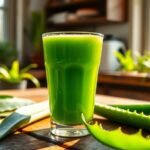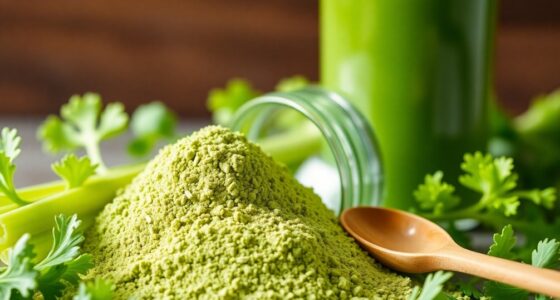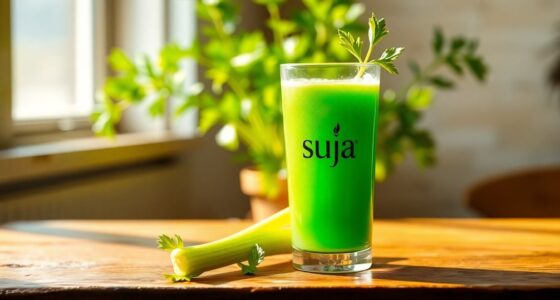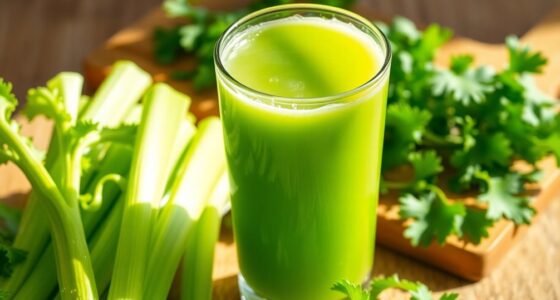Eating aloe vera can dramatically boost your health. It supports digestion, enhances skin hydration, and may even help reduce fine lines and wrinkles. With just 10 calories per serving, it's a low-calorie option rich in vitamins, minerals, and antioxidants. Aloe vera's anti-inflammatory properties can soothe irritations, while its fiber content aids gut health. But that's just the tip of the iceberg—discover even more surprising benefits that await you!
Key Takeaways
- Aloe vera juice is low in calories and rich in potassium and calcium, supporting hydration and overall health.
- Its antioxidants combat oxidative stress, protecting against chronic diseases like heart disease and cancer.
- Aloe vera promotes digestive health by aiding nutrient absorption and potentially relieving constipation and IBS symptoms.
- The anti-inflammatory properties soothe skin irritations, enhance skin hydration, and improve elasticity, reducing wrinkles and blemishes.
- Regular consumption can lead to a radiant complexion and improved overall well-being, but moderation is key to avoid gastrointestinal issues.
What Is Aloe Vera?
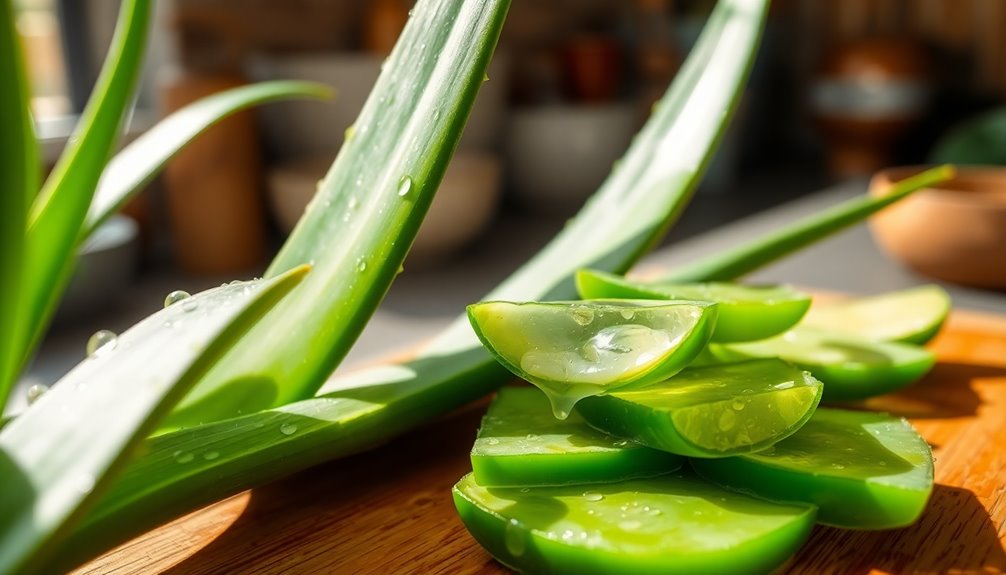
Aloe vera is a remarkable succulent plant known for its thick, fleshy leaves that can grow up to 19 inches long.
This medicinal plant is renowned for its health benefits of aloe, primarily due to the gel extracted from its leaves. Rich in over 75 active ingredients, the gel boasts vitamins, minerals, enzymes, and amino acids, making it a powerhouse for skin health.
You can also enjoy aloe vera juice, created by mixing the gel with water, offering a potent drinkable form. Many people use aloe vera to address various skin conditions, including burns and irritations, thanks to its soothing properties.
With its long history and global market value, aloe vera continues to be a popular choice for health and wellness.
Nutritional Profile of Aloe Vera
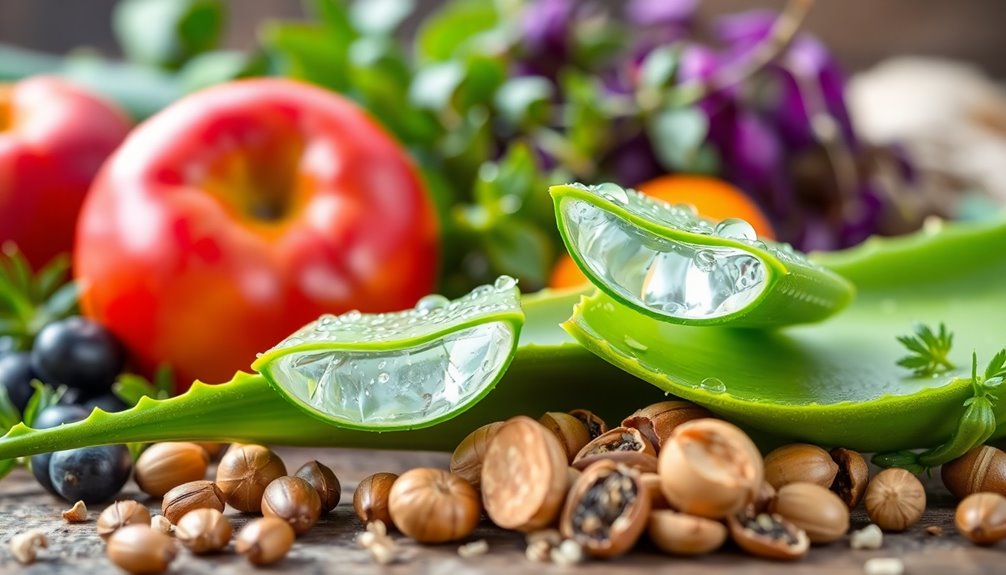
When you look at the nutritional profile of aloe vera, you'll find it's a low-calorie hydration source packed with essential nutrients.
An 8-ounce serving of pure aloe vera juice offers significant benefits, including antioxidants that help combat oxidative stress. Additionally, aloe vera juice is known for its natural anti-inflammatory properties, which can aid in digestion and soothe the gastrointestinal tract. Regular consumption of this refreshing beverage can also enhance skin health, making it a popular choice for those seeking to improve their complexion. Overall, the aloe vera juice health benefits extend well beyond hydration, providing essential nutrients that support overall wellness.
With its rich composition of vitamins, minerals, and dietary fiber, aloe vera supports your overall health in a revitalizing way.
Nutrient Composition Overview
The nutrient composition of aloe vera is impressive, offering a range of health benefits in a low-calorie package.
An 8-ounce serving of pure aloe vera juice contains just 10 calories, making it a great choice for those watching their diet. It provides 74 milligrams of calcium and 110 milligrams of potassium, which are essential for maintaining bone and heart health.
Additionally, with 1 gram of dietary fiber per serving, aloe vera juice promotes gut health and aids digestion. One of its standout features is that it contains no sugars, allowing you to enjoy it without worrying about sugar intake.
Plus, it's rich in antioxidants, helping to combat oxidative stress and support your overall well-being.
Low-Calorie Hydration Source
With its impressive nutrient composition, aloe vera juice stands out as a low-calorie hydration source. Containing just 10 calories per 8-ounce serving, it's perfect for those looking to maintain or lose weight.
The juice provides essential minerals and supports hydration and electrolyte balance, making it an excellent alternative to sugary drinks.
- Contains 2 grams of carbohydrates and 1 gram of fiber for digestive health
- Rich in calcium, sodium, and potassium to boost hydration
- Aids in weight management without compromising on taste or nutrients
Incorporating aloe vera juice into your daily routine not only keeps you hydrated but also helps you meet your nutritional needs while staying low-calorie. Additionally, the plant's medicinal properties can further enhance overall well-being.
It's a win-win for your health!
Antioxidant-Rich Benefits
Aloe vera's impressive antioxidant profile makes it a powerful ally in protecting your body from oxidative stress. Packed with antioxidants, particularly polyphenols, it may reduce the risk of chronic diseases like heart disease and certain cancers.
An 8-ounce serving of pure aloe vera juice contains only 10 calories while offering essential vitamins and minerals, including 74 milligrams of calcium and 110 milligrams of potassium. These nutrients support overall health and contribute to skin health.
By reducing blemishes and dark spots, aloe vera can help you achieve a clear complexion. Plus, its beta carotene content promotes eye health, potentially improving vision and lowering the risk of age-related eye disorders.
Embrace aloe vera for its remarkable benefits!
Health Benefits of Aloe Vera
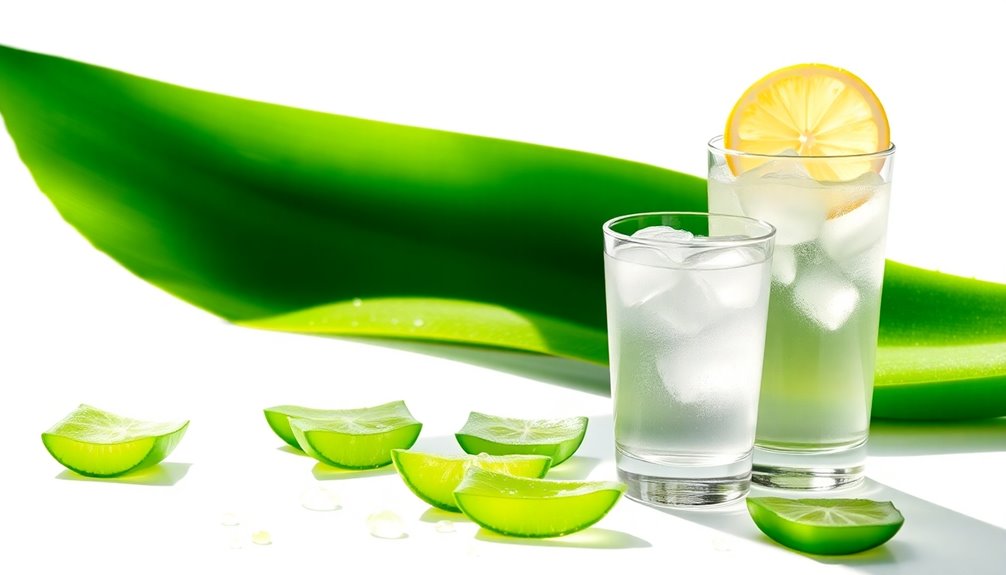
When you think about aloe vera, consider its impressive antioxidant properties that can help protect your body from chronic diseases.
Not only does it support your digestive system, but it also enhances your skin health, improving elasticity and reducing wrinkles.
Including aloe vera in your routine could be a simple way to boost your overall well-being.
Antioxidant Properties
While many people appreciate aloe vera for its soothing properties, its antioxidant benefits are equally significant. Aloe vera is packed with polyphenols, powerful antioxidants that help combat free radicals and reduce oxidative stress. This can lower your risk of chronic diseases, like heart disease and certain cancers, though more research is needed.
An 8-ounce serving of pure aloe vera juice contains just 10 calories and is rich in vitamins C and E, enhancing its antioxidant properties. Plus, aloe vera's compounds can ease inflammation, promoting overall health.
Here are some key points to evaluate:
- Supports your body's defense against free radicals
- May reduce inflammation-related risks
- Contains essential vitamins for better health
Incorporate aloe vera into your diet for a boost!
Skin Health Improvement
Although many people know aloe vera for its soothing properties, it also plays an essential role in enhancing skin health.
Drinking aloe vera juice can greatly improve skin hydration, helping to reduce the appearance of fine lines and wrinkles. This magical plant is particularly beneficial for women over 40, as studies show it boosts collagen production, promoting skin elasticity and reducing signs of aging.
Its anti-inflammatory properties soothe skin irritations, making it an effective remedy for acne, cold sores, and minor burns.
Additionally, aloe vera's detoxifying effects contribute to clearer skin by minimizing blemishes and dark spots.
Regular intake of aloe vera juice supports overall skin health, giving you a radiant glow you'll love to show off.
Digestive System Support
Aloe vera isn't just a skin superhero; it also offers remarkable support for your digestive system. Drinking aloe vera juice can help alleviate constipation, thanks to its natural laxative effects from anthraquinone glycosides.
Plus, its high water content keeps your digestive tract hydrated, promoting smooth digestion.
Here's how it benefits you:
- Supports nutrient absorption and efficiency.
- May provide relief from gastroesophageal reflux disease (GERD) and irritable bowel syndrome (IBS), according to preliminary research.
- Encourages the growth of beneficial gut bacteria, enhancing your overall digestive health.
Incorporating aloe vera juice into your routine can be a game-changer for your digestive wellness! Additionally, it is important to consider potential side effects of medications that may interact with aloe vera, ensuring a safe approach to health.
Aloe Vera and Digestive Health
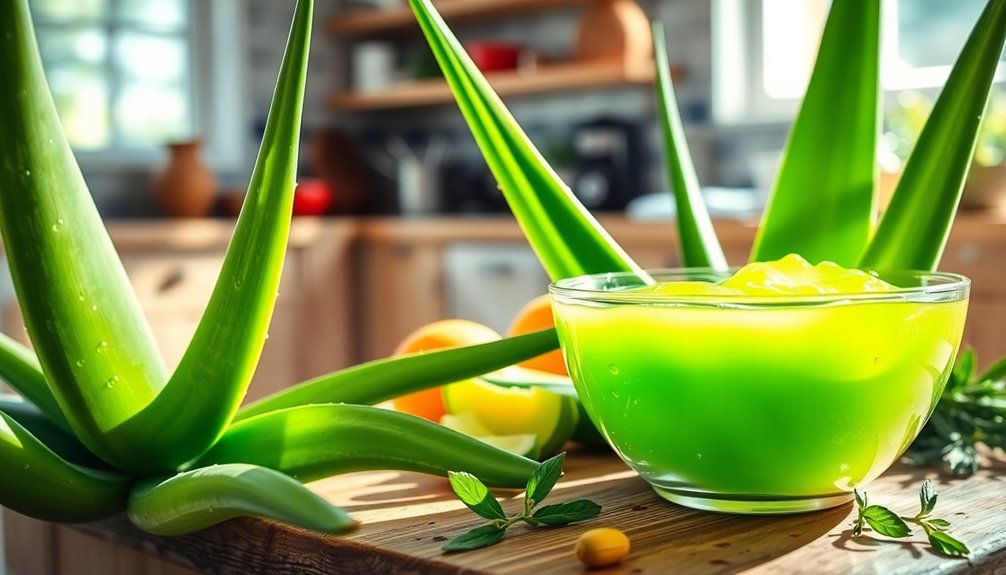
When it comes to digestive health, aloe vera offers a range of potential benefits that can enhance your overall well-being.
Aloe vera juice contains anthraquinone glycosides, which may have laxative effects to help relieve constipation by softening stool consistency. Preliminary research suggests it may also be beneficial for conditions like gastroesophageal reflux disease (GERD) and irritable bowel syndrome (IBS), though more studies are needed.
Additionally, aloe vera juice can improve nutrient absorption due to its powerful enzymes that break down fats and sugars. Regular consumption may support the growth of beneficial gut bacteria, promoting a healthier microbiome.
However, be cautious, as the FDA has removed aloe vera laxatives from over-the-counter sales due to safety concerns.
Aloe Vera for Skin and Wound Healing

As you explore natural remedies for skin care, you'll find that aloe vera stands out for its remarkable healing properties. This versatile plant is a go-to for skin issues, thanks to its topical aloe vera gel, which promotes healing for burns, cuts, and insect bites.
- It soothes sunburn with its cooling effects, alleviating pain and speeding up recovery.
- Aloe vera's antibacterial properties tackle acne, reducing redness and inflammation effectively.
- Regular use can enhance skin elasticity and minimize wrinkles, especially for those over 40.
With impressive anti-inflammatory properties, aloe vera not only supports wound healing but also transforms your skin.
Embrace this natural remedy for healthier, rejuvenated skin!
The Role of Aloe Vera in Weight Management
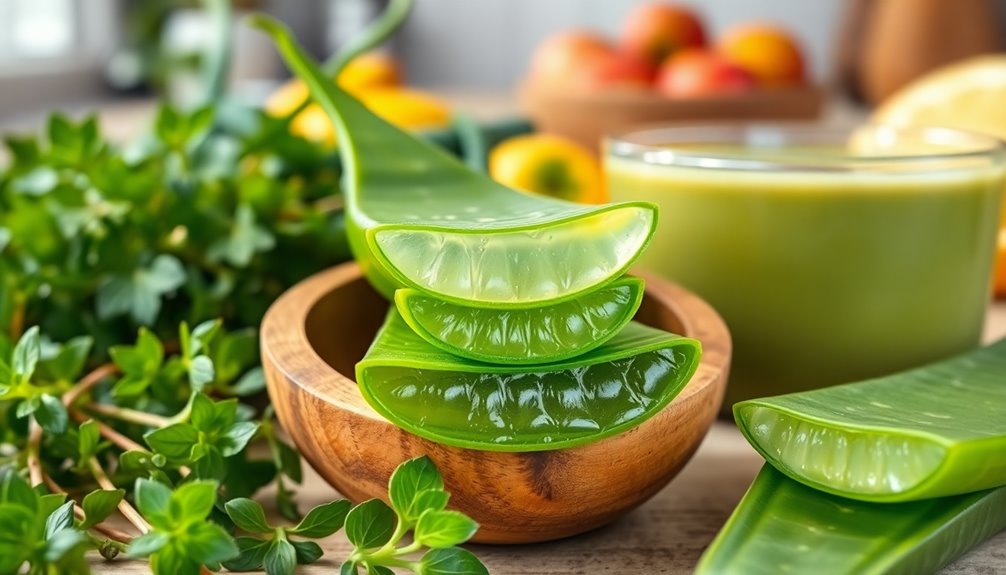
Incorporating aloe vera into your daily routine can be a game changer for weight management. Aloe vera juice is packed with calorie-burning compounds that can enhance your metabolism, making it a valuable ally in your weight loss journey.
Its detoxifying properties help cleanse your gut, reducing bloating and improving digestive health. By promoting regularity, aloe vera can alleviate constipation, further supporting your weight loss efforts.
Plus, with only 10 calories per 8-ounce serving, it's a fantastic low-calorie option. Drinking aloe vera juice in the morning not only provides hydration but also helps curb your appetite, setting a positive tone for your day.
Make aloe vera a part of your routine, and watch your weight management efforts flourish!
How Much Aloe Vera Should You Consume?
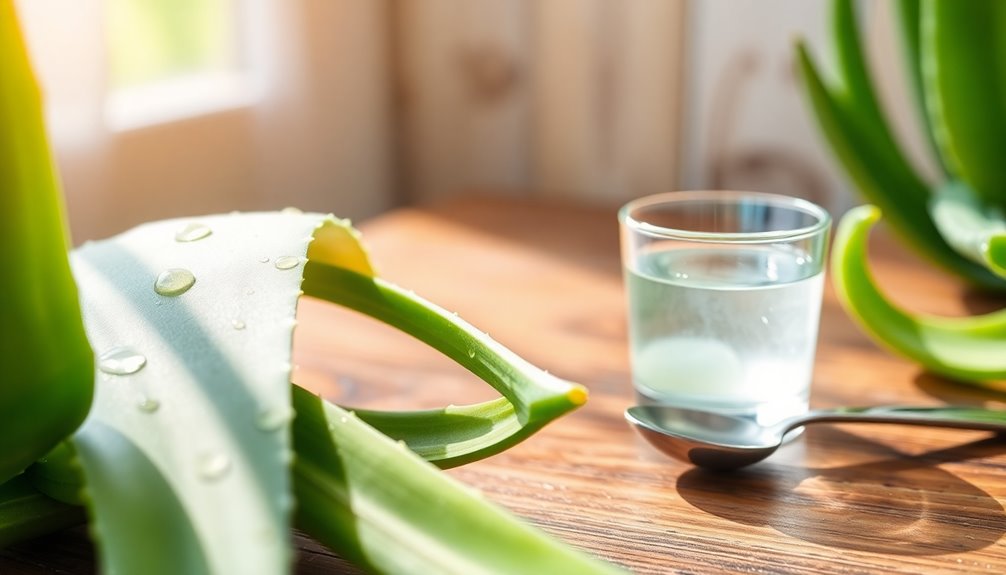
How much aloe vera should you really consume for ideal health benefits? To reap the rewards of aloe vera juice, it's best to start small and monitor how your body reacts. The recommended limit for daily consumption is one cup (about 240 milliliters) to prevent gastrointestinal issues.
Here are some tips for consuming aloe vera:
- Begin with 1 to 2 ounces to gauge individual tolerance.
- Suggested dosages vary: 50 to 200 milligrams for leaf gel capsules and 30 milliliters for liquid forms.
- Always consult a healthcare professional before adding aloe vera juice to your diet, especially if you have pre-existing health conditions or are on medication.
Adjust your intake based on your personal health goals and how you feel!
Potential Risks and Side Effects of Aloe Vera
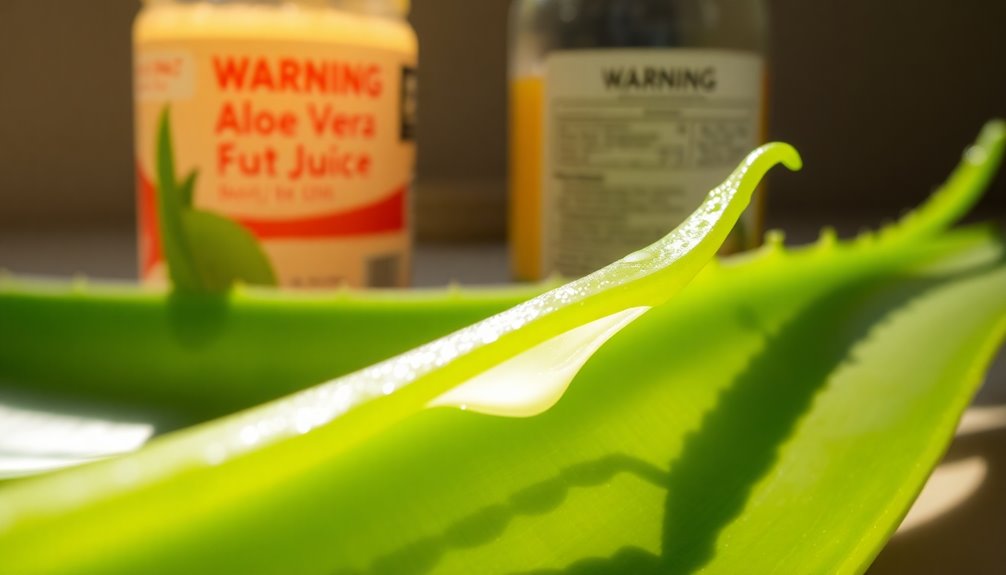
While aloe vera offers many benefits, it's important to be aware of potential risks and side effects.
Oral consumption can lead to cramps, diarrhea, and other issues, especially in high doses.
Even topical use might cause skin irritation for some individuals, so knowing how your body reacts is essential.
Topical Use Side Effects
Although aloe vera is praised for its soothing properties, it's important to be aware of potential side effects when using it topically.
While many enjoy the benefits, some individuals may experience:
- Skin irritation, such as redness or itching
- Allergic reactions, which can lead to hives or swelling
- Increased sensitivity or skin thinning with prolonged use
Avoid applying aloe vera on open wounds, as it may cause infection or hinder healing.
If you have sensitive skin, performing a patch test before extensive use is a smart move.
By staying informed about these side effects, you can enjoy aloe vera's benefits while minimizing risks.
Always listen to your body and discontinue use if any adverse reactions occur.
Oral Consumption Risks
When considering the oral consumption of aloe vera, it's crucial to understand the potential risks and side effects that can arise.
Common side effects, like cramps, diarrhea, and vomiting, often occur when you take high doses of aloe vera juice or aloe latex. These high doses can lead to severe complications, including belly pain, kidney damage, and electrolyte imbalance.
If you consume large amounts, you might also experience reduced potassium levels, which can disrupt heart rhythms. The FDA has discouraged using aloe vera laxatives due to safety concerns and insufficient testing.
Pregnant or breastfeeding women, along with children under 12, should avoid aloe vera intake. Always consult a doctor before adding aloe vera to your routine to mitigate these health risks.
Aloe Vera in Oral and Dental Health

Aloe vera isn't just a staple in skincare; it also plays a significant role in oral and dental health. Using aloe vera mouthwash can dramatically improve your oral hygiene by effectively reducing plaque and gingivitis. Its antibacterial properties help combat harmful bacteria like Streptococcus mutans, ensuring a healthier mouth.
- Accelerates healing of canker sores
- Fights Candida albicans to prevent infections
- Serves as a natural alternative to harsh chemical mouthwashes
Incorporating aloe vera into your routine not only enhances your oral health but also provides a revitalizing experience without the side effects of traditional products.
Incorporating Aloe Vera Into Your Diet

While taking care of your oral health with aloe vera mouthwash, consider the benefits of incorporating aloe vera into your diet.
Drinking aloe vera juice offers a low-calorie option with only eight calories per eight-ounce serving, packed with calcium, potassium, and antioxidants. Aim for one cup daily, starting small to gauge your tolerance and monitor any gastrointestinal symptoms.
Regular consumption can boost digestive health by enhancing nutrient absorption and easing issues like acid reflux and irritable bowel syndrome (IBS).
Plus, aloe vera juice can elevate your hydration levels, making it a fantastic natural alternative to electrolyte drinks during workouts. Additionally, studies suggest that regular coffee consumption may also aid in hydration and improve athletic performance.
Not to mention, it may improve skin health from within, promoting better texture and radiance through its detoxifying and hydrating properties.
Frequently Asked Questions
What Happens if We Eat Aloe Vera Daily?
If you eat aloe vera daily, you might notice several health benefits.
It can help your digestion by softening stool and relieving constipation, thanks to its natural laxative properties.
Drinking about one cup of aloe vera juice can hydrate you, support your skin, and even boost your immune function.
Just remember to start slowly and keep it moderate to avoid any gastrointestinal discomfort.
Your body will thank you for it!
Does Aloe Vera Cleanse the Colon?
Did you know that around 20% of adults experience constipation regularly?
Aloe vera can indeed help cleanse the colon due to its natural laxative properties. It softens stool and promotes regular bowel movements, making it a potential aid for digestive health.
However, you should consult a healthcare professional before using it as a colon cleanser, as safety concerns surround its efficacy and possible gastrointestinal side effects.
Always prioritize your health and safety.
Is Eating Raw Aloe Good for You?
Eating raw aloe vera can be good for you, as it's packed with vitamins, minerals, and antioxidants that promote overall health.
Its gentle laxative properties may aid in digestion and relieve constipation. Plus, it's low in calories, making it a great addition to your diet if you're managing your weight.
However, be cautious with the amount you consume, as high doses can lead to adverse effects. Always consult a healthcare professional before adding it to your routine.
What Does Aloe Vera Do to a Woman's Body?
What if you could enhance your skin, boost digestion, and support your immune system all with one plant? Aloe vera does just that for women.
It hydrates your skin, reducing wrinkles while promoting elasticity. You'll find relief from digestive issues and enjoy better gut health.
Plus, its antioxidants strengthen your immune defenses. By incorporating aloe, you can also help manage weight and regulate blood sugar, making it a powerful ally for your health.
Conclusion
So, while you might think that eating aloe vera is just a trendy health fad, it actually packs a punch with its impressive benefits. From boosting your digestion to enhancing your skin's glow, this succulent does more than just sit pretty on a windowsill. But remember, moderation is key—too much of a good thing can bite back! Embrace aloe vera wisely, and it just might surprise you with how well it supports your health.
Cindy thoroughly researches juicing trends, techniques, and recipes to provide readers with practical advice and inspiration. Her writing style is accessible, engaging, and designed to make complex concepts easy to understand. Cindy’s dedication to promoting the advantages of juicing shines through her work, empowering readers to make positive changes in their lives through the simple act of juicing.






